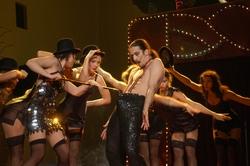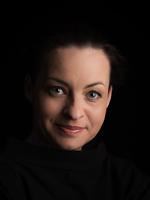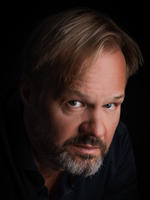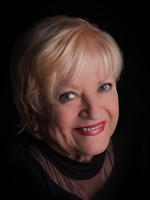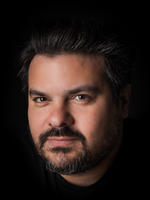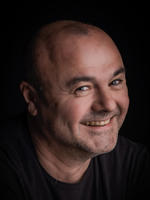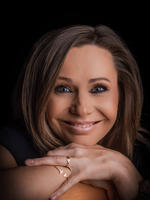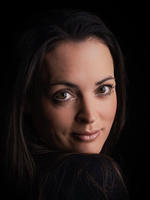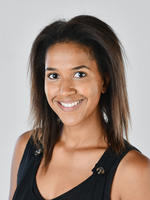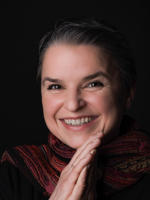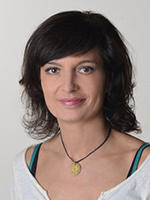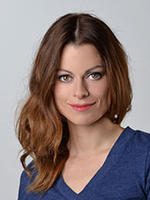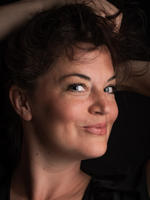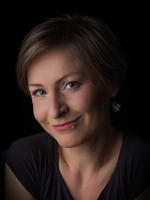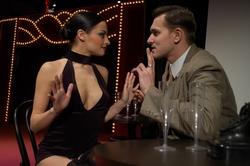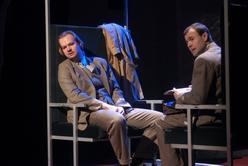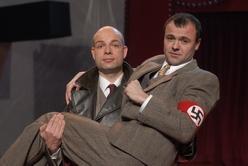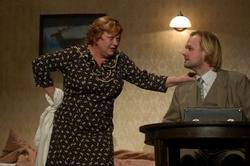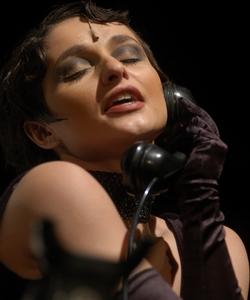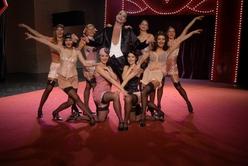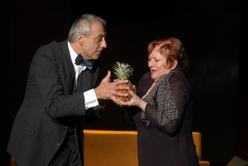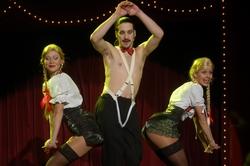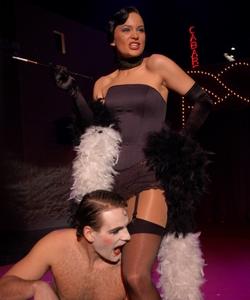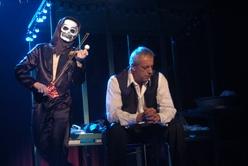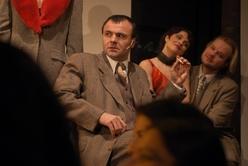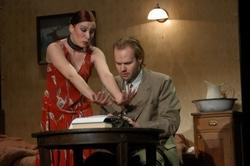Cabaret Showed Disposition of Forces
Jiří P. Kříž 12. April 2003 zdroj Právo
I have seen only three of four first night performances of Cabaret. For this reason, I am interested in the force of a theatre with the capacity to engage four actors in one role and in the manner in which the undeniable success of the Brno City Theatre both in the country and abroad together with its indisputable professionalism reflects in the theatre world. Amongst the crowd of Czech pseudo singers (take a pop star well-supported by the media, put this clumsy actor and singer in a thin soup of the seventies and eighties, and that’s it), only two theatres may boast of the quality musical actors: the Karlín Music Theatre and the Brno City Theatre. The former one was killed on the top of its popularity by the Prague municipality, while the latter is building an incredibly generously designed new music theatre in Brno. The implementation of the musical project Cabaret justified the credit given to the theatre lead by the general manager Stanislav Moša. Jitka Čvančarová, Markéta Sedláčková, Helena Dvořáková and Radka Coufalová work very hard in order to interpret the part of Sally in the musical apparently with an immense easiness, however with a different nature. The same applies to Jana Musilová, Ivana Vaňková and Pavla Ptáčková (Miss Fritzie). There are no better musical actresses anywhere in the Czech Republic! The same could be said of Igor Ondříček, Stano Slovák, Ján Jackuliak (Cabaret Manager), Petr Gazdík, Petr Štěpán (Clifford Bradshaw), Viktor Skála, Tomáš Sagher, Alan Novotný (Ernst Ludwig) and of the group of Kit Kat Girls, in which there are such personalities as Majerová, Tománková, Králová, Holišová, Ďurďová, Kyselová... And what about the “old” ones without whom almost any musical can exist? Herfortová, Kolářová, Kolář, Janský!
The success of the Karlín theatre in Japan and the one of the Brno theatre in Europe is not false. And the spectators of Brno are not silly, especially not the young ones.
When the Box Office is Sold Out for a Long Period of Time...
Tomáš Hejzlar 8. April 2003 zdroj Haló noviny
The new Brno performance prepared by the experienced German opera, drama and musical director Pavel Fieber reflects not only a sense of preserving traditions but also a subtle and sensible modern adaptation. With his typical point of view, sixty-two years old Fieber approaches the musical not with the American external clamour but with European elegance, so that he could draw with more and sometimes almost freezing crudity the hard destiny of those who did not accept Hitler’s ideology, staying apart in the times of the omnipresent intense ideological propaganda. They stayed faithful to their opinion, standpoints and their life credo. Some of the previous staging did not express this principal idea that clearly.
The Brno City Theatre offers the director adequate conditions for the development of his creativity. “The atmosphere of the theatre creates ideal conditions for the perceiving of such a topic, as the theatre group here is well-balanced, mature from the artistic point of view, sensible and intuitive, perfectly “welded” and compact in their expression and it also offers outstanding personalities for the leading parts,” the director Pavel Fieber appraised the theatre group of the Brno City Theatre.
Many a spectator may have preferred Stano Slovák in the role of the Cabaret Manager (and the Customs Officer) due to his popularity, however Igor Ondříček or even less famous Ján Jackuliak mastered – with their personal interest and due to the director’s influence – their parts so that their performance would comply with the overall concept. Radka Coufalová and Jitka Čvančarová, the actresses interpreting the part of the cabaret singer Sally Bowles, are such well-known personalities in the musical world, that their names will become strong attractions. However, also so-far much less famous Helena Dvořáková is through her hidden coquetry able to present the cabaret atmosphere… And adding on the top of it her typical cabaret singing with sonant depths and well-balanced heights, she can be perceived as a prototype of this character.
My words of appraisal, which do not apply only to the actors, should include two more names at the end: without unnecessary decorations, Christian Floerren designed an impressive setting which is multi-functional and creative. Due to Andrea Kučerová, a well known and much experienced costume designer, the spectator has a feeling s/he is in the real cabaret or in a poor room of a German citizen of the thirties.
The theatre manager Stanislav Moša may be satisfied: the advance booking office is sold out for several months. As it looks now, this will become a long-term phenomenon.
First Night to be Continued
Jaroslav Pokorný 7. April 2003 zdroj Scena cz
Brno´s Contribution to the Musical Family
Wilkommen, bienvenue, welcome!
May I Extend my Warmest Welcome to You.
Entertainment and joy are back in Brno. Crowds of spectators enter the Brno City Theatre. “Bar singers are beautiful here, the orchestra is also beautiful and cabaret singers are also beautiful, very beautiful” and everybody is kept busy.
Suddenly, our tonight’s guide enters the stage – the Cabaret Manager Stano Slovák (Igor Ondříček or Ján Jackuliak), extending his warmest welcome to the Cabaret. To the Cabaret by John Kander, Fred Ebb and Joe Masteroff, this time directed by the German director Pavel Fieber. Everybody enjoys her/himself; however, you feel that something is in the air.
Several cabaret numbers to begin with and then it starts. Our nice and witty guide changes into a creeping deceitful snake, starting a splendid deadly play of chess with people’s destinies. Relations among individuals, career race, intrigues, cowardice and fear, but also love, desire and implacable machinery of a fanatic crowd which holds us in its hand. This is a heavy stone which gives to the cabaret farce further, almost philosophical, dimensions; this is the stone which is still so topical. The guest director decided to put the major stress on the influence of the group, creating thus a performance containing two different parts. While the first one appears to be quite non-compact and fragmented, the other brings a handful of keys not just to the individual problems but also to the performance as such. The grace and precision are also worth mentioning with which Pavel Fieber managed to co-ordinate such a large crowd.
Besides Stano Slovák exceptionally gifted with a perfect voice, physical potential, face expressions and most of all feeling which gives his character an incredible changeability and authenticity, two more actors should be mentioned: Herr Schulz extraordinarily interpreted by excellent Ladislav Kolář (alternated by Karel Janský) and Miss Schneider - Miroslava Kolářová (alternated by Zdena Herfortová). Their performance is an actor’s gala concert, which quite perfectly reflects a terrible human tragedy of a romance marked by the bad luck of being born at a wrong time in a wrong place.
The Cabaret of Brno is a successful addition to the musical family which just confirms the fact that in Moravia they can do their job more than perfectly.
Cabaret: A Skilfully Directed Show
Kateřina Bartošová 21. March 2003 zdroj Lidové noviny
The Brno City Theatre presents
the famous American musical
directed by Pavel Fieber
The Brno City Theatre has all the capacity for successful staging of the musical by the three authors Kander, Ebb and Masteroff. Especially it has a group of actors with musical and dancing talents, so that there can be several actors alternating in one part.
A well-balanced musical has been produced under the direction of the guest Pavel Fieber, a German director of a Czech origin. The musical covers a range from a sheer entertainment through a picture of the then decadence to the tragic end of human relations affected by the political situation.
Since 1966, when Cabaret was first presented in New York, an endless number of staging have been presented including the famous Oscar movie with Michael York and Liza Minneli interpreting Clifford and Sally. Also in this country, the musical belongs to favourite works; at present, it is presented in the Na Fidlovačce Theatre directed by Deák. The Brno version of the musical offers the spectators excellent singing and dancing, famous hits and attractive interpretation not only of the main characters but also of many little characters of a story situated in a cabaret in Berlin that creates a background reflecting the beginning of the fascism in Germany. Radka Coufalová shines as a star singer in one of the alternation casting, interpreting the dancer Sally, the partner of the writer Clifford. Zdena Herfortová and Karel Janský (alternated by Miroslava Kolářová and Ladislav Kolář) are the main characters of a parallel story of a relation of an ageing boarding house owner Miss Schneider and the Jew Schultz, a relation prematurely destroyed by the history. Their advantage is accurate and sensitive acting which culminates in Schultz’s scene in the engagement party, when he interprets with charming playfulness his Jewish song, and the following radical turn when Zdena Herfortová shows the impressing change of her character from liberating joy to a definite lost of courage, strength and hope.
The wheedling changeable character of the Cabaret Manager interpreted by Ján Jackuliak (alternated by Igor Ondříček and Stano Slovák) is just perfect; he represents a slimy truckling entertainment seller who is capable of drawing the crowd offering it glittery cheap attractions as well as a fanatic thought of a superior race. The dangerous manipulator and the death at the same time is the key character which gives the play its impressive range exceeding a simple educational message which it also includes (direct setting design finishing the story with a large flag with the swastika flying over the stage, etc.).
The setting fully corresponds to the development of the story; everything is happening on the background of a sturdy and free and easy environment which is in contrast with the upcoming unavoidable tragedy. The illustration full of neon lights and bright colours always remains on the stage, and just lights show other mobile stages, moving scenes of the room, etc.
Fieber´s version of the play does not aspire to be very inventive, however it succeeds in reflecting the sense of the original and it is a precisely and skilfully prepared show.
Cabaret will become a Favourite Piece of the Audience
Luboš Mareček 4. March 2003 zdroj MF Dnes
The Brno performance of
the famous musical entertains the spectators
and appeals to them at the same time
In an uncommon series of four first night performances, the Brno City Theatre presented its last novelty from Thursday to Sunday. In the world-famous musical, four actresses alternate in the leading part. Sixty actors appear then on the stage – actors and civil employees of the theatre. On the top of it, add an eleven-member orchestra, and you will get quite a crowded robust show for the existing theatre conditions. However, the Cabaret by the German director Pavel Fieber is far from being exaggerated. This is a clever, sometimes maybe too literate theatre which attracts the spectators with a series of hits, an extraordinary story and a quality music.
Fieber´s dramatisation stresses the impressive tragicomic duality: a bloody history is reflected in the carefree world of the Cabaret. For such a reason, the rooms of the main characters come as movable scenes directly in the centre of the Cabaret. And for such a reason the Cabaret Manger himself changes without problems in a Nazi, bouncing Hitler or the Death. The Cabaret Manager’s metamorphosis seems to stress the director’s endeavour to make the spectacle appealing. In times when many a growing child does not even know who Hitler was, such an academic director’s approach may be quite a good idea.
However, the Cabaret presented in Brno is not limited to a dry instructive performance. It offers exceptionally good interpretations of the Cabaret Managers by Igor Ondříček and Ján Jackuliak. It offers the spectators the perfectly singing Radka Coufalová and Helena Dvořáková as Sally Bowles. The majority of acting and playing parts are strong points of the performance and it would be difficult to mention them all. The spectators can look forward to the quality dancing parts of the choreographer Vladimír Kloubek. The perfect sound of the eleven-member orchestra of Karel Cón is a real “delicacy”. Of course, everything is wrapped in the provoking “suspender” costume packing designed by Andrea Kučerová. The Brno City Theatre repertoire thus offers one more attractive piece for the spectators.
Directing Cabaret, Pavel Fieber did an excellent job
Simona Polcarová 4. March 2003 zdroj Rovnost
Great expectation preceded the staging of the musical Cabaret by John Kander, Fred Ebb and Joe Masteroff in the Brno City Theatre, not just due to the musical itself but also due to the casting: there are four actresses alternating in the part of Sally Bowles and three cabaret managers. The guest director is Pavel Fieber from Germany, who, however, when filling questionnaires, always puts a Moravian town Krnov as his birthplace.
The story of Cliff Bradshaw, an American writer who comes to Berlin in the thirties of the last century to feel the atmosphere and to find inspiration for his next novel mingles with the cabaret environment, where Sally Bowles, an English singer and Cliff’s femme fatale appears besides the “Kit Kat girls”. However, nationalist ideas creep slowly but inevitably into the light-hearted environment of the freedom-liking Berlin of those times and into the lives of the characters. Equally as in the original play, the easiness and exuberance and funny and entertaining moments are disappearing, alternated with tragically sobering moments. Fieber is enough sensible to express both levels reflected in the play – he is able to present frivolous and jolly environment of the Cabaret, making use of every joke; however, later on in the engagement party of Miss Schneider and the Jewish greengrocer Mr. Schultz, he presents with impressing preciseness the moment when Hitler’s theory on the superior human being and impure human race begins to rule in the society. The change of the atmosphere is documented not just by the situations presented, but also by the songs in the Cabaret and of course, by the still-present and all-demonstrating Cabaret manager.
Fieber´s direction is a sure bet on the exact and impressing interpretation of the original, and he wins... When the song “Nation, Nation”, a symbol of the nazi ideology, echoes through the theatre, shivers run down the audience’s spines in spite of the sweet melody. When the actors lift their hands to “heil” and put armlets with swastikas on their arms, the horror of the situation is shown clearly in spite of the lovely melody. Fieber creates an emotion-filled scene when Fritzie Kosta sends children to shout at Schultz words offending Jews. Then, hidden under a capuche and with a mask of the Death on his face, the Cabaret Manager creeps towards Schultz and plays a sad melody for him, his instruments being just a stick and a bone, and scary archive film spots of mass grave are presented. Fieber preserves the message expressing the pervertedness of the Nazi despotism and presents it very often in the play (sometimes it seems that he uses the Nazi symbols too often), however he does not make any attempt at making the play more topical or new (with the exception of making Fritzie Kosta an informer). He does a good job offering impressive show full of dancing scenes (choreography Vladimír Kloubek), which offers a perfect show and almost perfect sound (Miroslava Kolářová interpreting Mrs. Schneider does not seem too sure of herself). It is worth mentioning that the lyrics were newly translated by Jiří Josek, so the songs are presented in a new and so far unknown versions. The spectator will notice the new version especially in the case of the title song Cabaret. The new translation saying “the world is a show and cabaret, so let’s play our part in it” instead of the original translation “don’t cry over your glass of bear, life is a cabaret” surely is a good thing excellently corresponding to the performance.
In terms of the first night performance, perfect acting should be mention of Helena Dvořáková and Igor Ondříček interpreting Sally and the Cabaret Manager, respectively. Dvořáková can be explosive, direct and careless (especially in the first half of the performance), however she is capable of feeling the pain of her character and reflecting the adequate mood in songs in serious scenes. She perfectly expresses all the levels of Sally’s personality and her singing does not fall behind her acting, which makes her an actress of an exceptional quality. The really excellent Igor Ondříček interpreting the Cabaret Manager used his opportunity to the maximum: he goes through the whole performance as a chameleon without influencing directly the happenings on the stage, however, he controls it and decides its character in a way. Ivana Vaňková interpreting Fritzie Kosta is also interesting: her loveliness, tenderness and servility changes into a dangerous and cruel aggressivity. As Cabaret has several alternate castings, it is quite probable that it offers several actors combinations to which we will get back in some other article.
Cabaret of Brno will entertain you...
Markéta Havelková 1. December -1 zdroj Theatres, seznam.cz
Cabaret of Brno will entertain you and Teach You a Lesson at the Same Time
Maybe its good to remember that it was in Brno where the Czechoslovak first night of Cabaret took place in the then State Theatre Brno (the Reduta theatre building) in 1977. The musical full of hits returns to Brno presented in a completely new “outfit”. At present, Cabaret has been staged in the Prague and Jihlava theatres.
The director Pavel Fieber, who comes from Krnov, is an actor, singer and director in Germany. He based his work on a breathtaking and extraordinary story and a quality music. The new staging of the musical does not bring anything new and quite often it literally copies the original. Besides, it is not easy to compete with the famous film version of the musical so firmly anchored in the spectators´ minds. In the play itself, there are several reminiscences referring to the film.
Besides entertainment, the musical adverts to a risky playing with the Nazism and to the very topical question of anti-Semitism. The tragicomic double face of the then world is reflected in the cabaret which creates an illusion of an easy-going life with a cruel history in the background. The appealing impact of the play is still more stressed by the non-historical character of the Cabaret Manager. The demonstrator and the guide through the story undergoes a metamorphosis in Hitler, the Nazi and the Death. At the end, the stage filled with swastikas makes a very depressive impression. In the interest of the instruction of the growing youth or reminding the horrors of the war, such an approach of the director is quite a good idea.
Cabaret is a unique performance also due to the interpretations of leading and other parts (excellent Ján Jackuliak and Igor Ondříček alternate interpreting the Cabaret Manager). The majority of actors present a really high-quality performance and the director is aware of it: he would like to take the whole group to guest in his home theatre in Germany. Another advantage is a perfect sound, work of the eleven-member orchestra of Karel Cón, who often works for the Brno City Theatre. The traditionally quality costumes (this time with provoking suspenders) together with choreography contribute to this “purebred” show.
Cabaret (in the Brno Municipal Theatre)
1. December -1 zdroj Světla ramp
“Oh, nation, nation, look ahead! You are strong enough to rise again. We are in poverty now, tomorrow’s world is ours, the day of victory is greeting us...” Any time I hear the mighty song sung by children on the stage to incite the others to act in hammered Germany at the beginning of 1930s, it makes my flesh creep. “O Vaterland, Vaterland, zeig’ uns den Weg...!” What catching, compelling! – What obtrusively Kander managed to devote in one of politically most exposed musicals the greatest deal of his invention to such a disgusting thing being argued against in the Cabaret – coming of Nazism. But you need not worry. Political tractates do not drop from the excellent Brno presentation of the Cabaret like honey from combs. The story of prostitutes from the Berlin Kit Kat Club and a naive American writer in the city boiling with anti-Jewish excesses will move you and make you laugh. As for the Brno Municipal Theatre it should be said that after the goal-directed destruction of the Musical Theatre in Karlín by the Municipal Council it remains the only really professional musical company in the Czech Republic. Only in Brno they can afford three or four casts of soloists, only in the theatre at Lužánky Park presentations of the same quality as in London’s West End or New York’s Broadway can be admired - that is to say, the musical is not mere singing of songs, but dramatic, singing and dancing rules that cannot be betrayed. Europe (Germany, Austria, Benelux, Spain) already knows it is true about Moša’s theatre. Czech has not learnt that yet.

